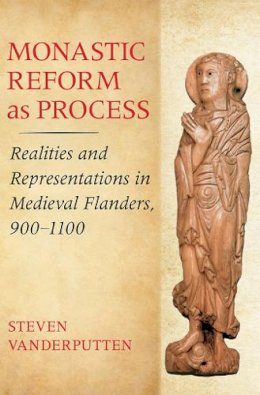Steven Vanderputten is Professor of Medieval History at Ghent University. He is editor of Understanding Monastic Practices of Oral Communication and coeditor of Ecclesia in medio nationis.
Monastic Reform as Process makes important interventions in monastic studies, institutional history, and the history of the central Middle Ages as a whole. Very few scholars move so easily and aptly from broad theoretical discussion to minute analysis of particular sources and back again. Steven Vanderputten advances both our empirical knowledge of monastic communities and our insight into the concept of institutional reform. (Walter Simons) In sum, Vanderputten's book is persuasive in part because its argumentation reflects the method of the reformers: built up bit by bit with careful attention to different contexts. It might be objected that Vanderputten casts his net too wide: if almost any activity that strengthened a monastery could count as reform, then of course it can be found repeatedly over time. But defining reform programmatically would beg the question, and Vanderputten's insistence that it came in many forms, depending on different contexts, avoids a priori classifications drawn from later reforming chronicles and instead provides a compelling overall framework for explaining change. The book will be invaluable for anyone working on the period and for historians of the twelfth century who want to avoid being blinded by the flashpoints described in reforming narratives. (Speculum) Rather than tackling a large field of study, Steven Vanderputten limits his focus to Benedictine monasteries in the county of Flanders.. The content here is integrated into a collective viewpoint that allows the reader to reflect on the nature and scope of monastic reforms of the High Middle Ages. As the author says, Rather than looking at reforms as 'flashpoint events', we need to view them as processes worthy of study in their own right.'. (Revue Bénédictine) "This excellent and clearly written book serves to highlight the ways in which a knowledgeable scholar of regional politics can dislodge overly simplisticyet entrenched narratives through deep contextualization. Vanderputten demonstrates the unreliability of discourses of 'reform' so convincinglythat the reader will be unable to use the word casually again.... This work will be essential not only to researchers of central medieval Flemish history or the history of monastic reformbut also those interested more broadly in the processes of medieval institutional changeparticularly if they are seeking a model for how to situate the initiatives of individuals within larger regional histories." —Kate Craig (Comitatus) This is an important book, a sustained discussion about the nature and meaning of monastic reform in one time and place that should encourage other, similar studies.... I hope Vanderputten's study finds readership not only among those interested in Flanders or monasticism in the central Middle Ages or even ecclesiastical reform more generally. For this is a book about how institutions change, the opportunities available to those who want to change them, and the limits they face in the attempt. It is history as process. (The Medieval Review) Vanderputten's Monastic Reform as Process reflects where medieval history must go in the twenty-firstcentury. It is rich in archival research, harnessing emergent digital databases to organize an impressiverange of sources effectively which lay beyond the grasp of previous generations of scholars. Yet theauthor directs his inquiries towards key historical questions which traditional scholarship has raised, butcould not answer. The book is an excellent study of monastic reform in medieval Flanders, whichaddresses issues medievalists care about. Its historiographical corrective should appeal to a widerhistorical audience. It also represents a significant step forward as an approach to medieval history,conditioned by the new realities of historical study in the twenty-first century. (H-France Review) Vanderputten's book is persuasive in part because its argumentation reflects the method of the reformers: built up bit by bit with careful attention to different contexts.... [Monastic Reform as Process] will be invaluable for anyone working on the period and for historians of the twelfth century who want to avoid being blinded by the flashpoints described in reforming narratives. (Speculum) His broader arguments are almost surely correct and might be considered hypothetical templates for reexamining other charismatic reformers, such as Odilo of Cluny and William of Dijon. (American Historical Review) Vanderputten elegantly argues that early-11th-century monastic reform can be understood only within an explicit long-term context of the slow, cumulative development of individual monasteries, and that this reform saw each monastery as a world unto itself, with a reforming abbot using his community's traditions to gradually transform the community into the ideal monastery. Summing Up: Highly recommended. (Choice) Overall, and especially for its effective interpretation of the motives that led medieval monastic authors to choose their subject matter and story-lines, this is a book that will repay reading and re-reading. (Journal of Ecclesiastical History)

